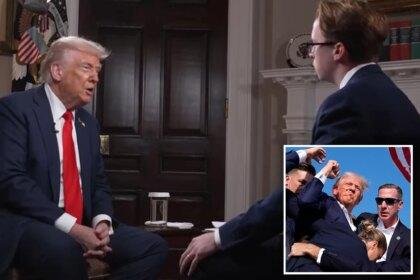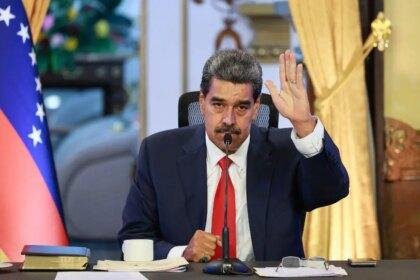Texas National Guard Deploys to Chicago Amid Controversy
In a significant move that has sparked political debate and concern among local leaders, members of the Texas National Guard have begun arriving at a U.S. Army Reserve facility in Elwood, Illinois. This deployment is part of a federal initiative aimed at bolstering security for U.S. Immigration and Customs Enforcement (ICE) agents and facilities in the region. The arrival of approximately 200 troops has raised questions about the implications of federal military presence in local communities.
Troops Arrive in Elwood
On Tuesday afternoon, CBS News Chicago reported sightings of Texas National Guard members in camouflage uniforms at the U.S. Army Reserve Training Center, located about 50 miles southwest of Chicago. The facility has been transformed into a temporary base, complete with trailers for living quarters and fencing erected around the perimeter. Soldiers were seen moving in with personal belongings, some carrying rifles and folding chairs, likely for meetings and training sessions.
Retired U.S. Army Maj. Gen. Richard Hayes, a veteran of over 30 years, noted the unusual nature of this deployment. “This is novel. It doesn’t mean it’s necessarily illegal; it’s just different,” he stated. Hayes emphasized that the soldiers involved do not have a say in their deployment, as they are following federal orders rather than state directives.
Political Reactions and Concerns
Local political leaders have expressed frustration over the lack of communication regarding the deployment. State Representative Larry Walsh Jr. characterized the situation as “political theater,” highlighting a disconnect between federal and local governments. He urged the federal administration to engage in more transparent dialogue with state officials.
The deployment comes at a time when tensions are high regarding immigration enforcement. Illinois Governor J.B. Pritzker has been vocal in his opposition, stating that the federal government’s actions represent an “aggressive overreach.” He has called for a federal court hearing scheduled for Thursday, where the state and city of Chicago will seek to block the troop deployment.
Legal Challenges Ahead
The legal landscape surrounding this deployment is complex. A federal judge in Chicago has already scheduled a hearing to address a lawsuit filed by Illinois and Chicago officials, which seeks to halt the deployment. Meanwhile, a West Coast federal judge recently issued a temporary restraining order against the deployment of Texas National Guard troops to Portland, Oregon, indicating that legal challenges may vary by jurisdiction.
The Illinois National Guard has also been ordered to report for training, although it remains unclear if they will be stationed in Elwood. This dual deployment raises questions about the coordination and effectiveness of military resources in addressing local issues.
Community Impact and Safety Concerns
Local leaders, including Will County Executive Jennifer Bertino-Tarrant, have voiced concerns about the implications of armed troops in their communities. Bertino-Tarrant stated, “Our federal government moving armed troops into our community should be alarming to everyone.” She emphasized the need for local leaders to protect residents’ rights and safety amid this federal initiative.
Former Illinois National Guard Adjutant General William Enyart echoed these concerns, arguing that deploying troops from Texas-over 1,000 miles away-could pose risks to public safety. “They don’t have any of those contacts, who don’t have any of that network developed,” he said, suggesting that local knowledge is crucial for effective law enforcement.
The Broader Context of Immigration Enforcement
This deployment is part of a larger federal operation dubbed “Operation Midway Blitz,” which aims to enhance immigration enforcement across various states. The Trump administration has indicated that the National Guard will be tasked with protecting federal facilities, including an ICE processing center in Broadview, a suburb of Chicago.
The political backdrop of this deployment is significant. The Trump administration’s approach to immigration has been a contentious issue, often leading to protests and legal challenges. The involvement of the National Guard in immigration enforcement raises ethical questions about the militarization of local law enforcement and the potential for civil rights violations.
Local Protests and Legal Actions
As tensions rise, protests against the ICE facility in Broadview have intensified. Local officials are grappling with how to manage these demonstrations while ensuring public safety. Broadview Mayor Katrina Thompson has enacted a curfew limiting protest hours, stating, “I will always support the First Amendment and the right of people to peacefully protest. But as mayor, I must also balance the right with the safety and well-being of Broadview residents.”
Legal actions are also underway regarding the federal government’s installation of a fence around the ICE facility, which local attorneys argue was erected without proper permits. The outcome of these legal battles could have lasting implications for how federal and local authorities interact in matters of immigration enforcement.
Conclusion
The deployment of the Texas National Guard to Chicago represents a complex intersection of federal authority, state rights, and local community concerns. As troops prepare to begin their assignments, the political and legal ramifications of this decision will continue to unfold. With a federal court hearing on the horizon, the future of this deployment remains uncertain, and local leaders are poised to challenge the federal government’s actions in defense of their communities. The situation underscores the ongoing national debate over immigration policy and the role of military forces in domestic law enforcement.











